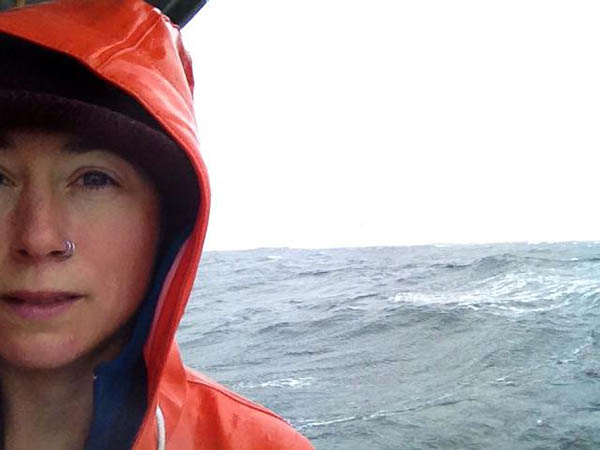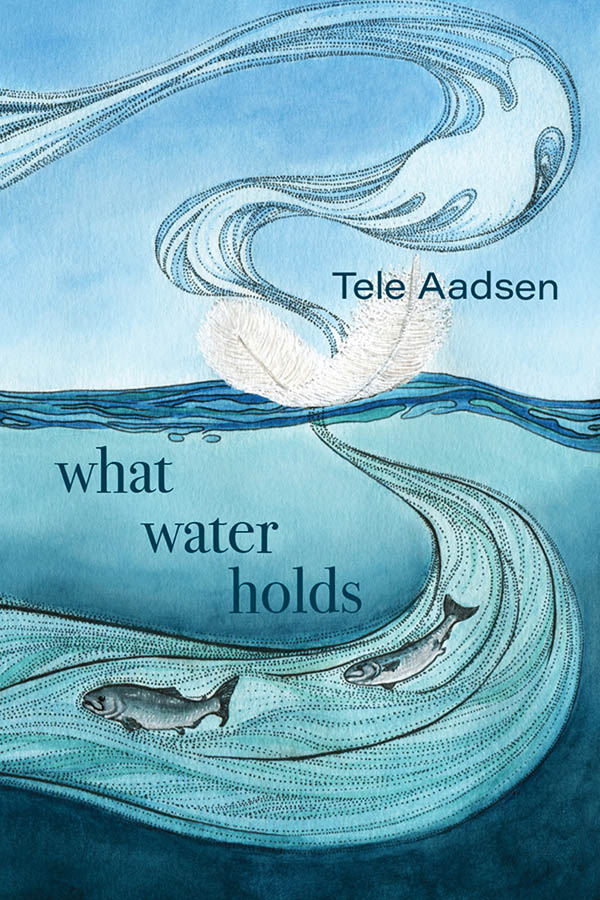[This series on May’s halibut fishing was originally published on Alaska Waypoints. Feels like an eternity ago, but I just realized I never finished sharing them here on Hooked. You can re-read Part 1 here, and the concluding Part 3 post should be up within a few weeks.]
****
The first fish to slap the deck is small, a 24-pounder. With Martin stationed at the hauler, I’ve taken the lead on training Ross how to handle and clean halibut, and class is now in session.
“Grab the gangion to hold the head steady, and bleed it like this.” I slice an X below the cheek, and a crimson sheet billows across the deck. “Keep each fish flipped belly side up, like this, so they don’t bruise.”
We admire the glow of the fish’s underside, and I feel a flicker of self-doubt. It’s been a year since I cleaned a halibut; will I remember enough to teach someone new? But as it turns out, memory is not the problem; verbally deconstructing a subconscious process is.
My hands move with Ouija-board confidence, the knife dancing through skin, muscle and membrane with a certainty that’s absent from my words. This lesson isn’t as simple as “Cut here,” but a more intricate puzzle of, “Cut here, slice that muscle, make a cut that flows with the gill plate. Bring your knife all the way through up there, but just a shallow cut along here through the top layer of tissue.” As if guiding a child’s first Crayoned alphabet-writing efforts, I place my gloved hands over his to re-direct the blade.
****
Before hauling, Martin and I gave Ross our final words of wisdom – or a last lecture, depending on your perspective – on what to expect. It’s hard to convey the perpetual motion intensity of longlining, when someone’s only comparative experience is the mental grind and long-term endurance test of trolling.
“Take care of all your bodily needs before we set or haul. Go to the head, get something to eat, stash a snack or something to drink on deck somewhere it won’t get slimed. Longlining is all about speed, and once we start, we don’t stop until everything’s done.”
Internally, I rolled my eyes. Longlining is hard work, sure, but with trips under a week long, it’s only a few days of hard. You focus, go wherever you need to go within yourself to do what needs to be done, and don’t stop moving until the captain says it’s time to stop. And for that, hopefully you make some good money, stay safe, and learn what your body and mind can endure when necessary.
Non-fishing friends shake their heads, wonder aloud why anyone would voluntarily put themselves through these demands, but it’s this pushing through and beyond my perceived limits that is precisely what I love about our work. New deckhands have to make the mental leap that fishing is a job where the harder you push yourself and the faster you work, the greater rewards you see. I’m hopeful that my work partner will understand that the faster we have everything cleaned, iced, re-baited, and scrubbed, the sooner we’ll be off our boots.
****
But right now, we’re in the midst of it, midway through our second set. Still an ocean away from being done. I slice, gut, and scrape my way through the pile, surreptitiously monitoring Ross’s process all the while. Cringing at the knife clutched in his hand as he awkwardly wrestles one wildly-thrashing halibut after another, I wonder how to explain the power of a fish that’s one massive muscle contorted with rage, fear, and survival instinct, and the urgency of handling halibut in the least disaster-prone manner possible. Whatever I’ve said so far doesn’t seem to have worked.
Sure enough, it’s not long before an angry 55-pounder thwacks him on the wrist. He jumps back, cradling right hand in left.
“Are you okay?” These three words have been bursting from my mouth several times a day.
He nods, looking at the fish with respectful eyes. “It’s like being hit with a baseball bat.”
When Ross and I begin baiting hooks in preparation for the next morning, the day’s end is close enough that I allow myself to start fantasizing about my bunk. We’ve soaked and hauled 2 sets. No major smash on either, we’ve chipped away perhaps a quarter of our quota today, a good training opportunity without ever being overwhelmed.
I’m quietly pleased with my crewmate’s work. His cleaning motions are slow but consistent, and he’s never stopped working. One moment’s stretch, gloved fists pressed into the small of his back, was the only indicator of the day’s demands. True to my Norwegian ancestors, stoicism impresses me.
I’m piercing a circle hook through a chunk of pollock, one eye on the fiery sun sinking into the horizon, when a new smell forces its way on deck. Unlike the usual looming odors of longlining, this one makes my mouth water immediately. “Oh my god, what are you making?” I call to the cabin.
In answer, Martin hollers out the galley window. “We don’t have any bay leaf or cardamom?”
Exasperated by his first venture into the spice cupboard, he grumbles adaptations to his recipe. Even in meal-making, a captain’s plans are constantly in flux.
It’s 10:00 when I study the deck. “That’s good, Ross.” All of the halibut, ling cod and yelloweye have been iced, 16 skates’ worth of baited hooks are draped over the cockpit, and the deck has been scrubbed. After 9 ½ hours on deck in constant motion, we’re done for the day. Tofu curry over rice, Extra-Strength Advil, and the bunks are calling us home, if only for a brief respite.





Tele,
Thanks for bringing back my memories of commerical halibut fishing. I laughed at “words of wisdom or lecture.” I guess it’s how one perceives it. I enjoyed this post, thanks.
Thanks so much, Vivian. It’s such fun when these posts succeed in taking friends back to their own experiences. Glad you enjoyed it, and hey — great big congratulations on your Poet of the Week status!
Again, thanks for taking me on your journey. But…are you speckled with blood from gutting the fish — or — are these injuries from the physicality of the job that don’t ‘wash off’? I so hope they ‘wash off’ lady.
Ha! No worries, Linda — it’s the gruesome consequence of our work, as understandably enraged/desperate creatures fling gore all over everything, including us. (My crewmate learned right away that he’d been needing to wear contacts; his glasses were a disaster!)
As a green deckhand myself, I am rooting for Russ. Oh please let this story have a happy ending. 16 skates?? I think it took me 30 minutes to bait my first skate. I am a slow … Learner. Which can be a skipper’s worst nightmare.
Stay tuned, Holly — I’m a believer in things working out in the end! And you were doing just fine with 30 minutes on your 1st skate — someday, I’ll have to write about one of the more humiliating days I’ve had on a boat, a disastrous day baiting stuck gear. It’d be generous to say I successfully handled one! But in this case, Ross and I were baiting snap-on gear, SO much easier and everything’s done in a few hours.
Are you still on the Amberlee? We should meet up during this blow; I’d love to hear how your first season treated you.
Hi Tele,
I just wanted to tell you that I love your writing. You live a fascinating life and you write beautifully about it. I just gave you the Liebster Blog Award. Hope that is okay! You can find it at http://annieboreson.blogspot.com. It’s a way for more people to find your wonderful blog. I know you are very busy so if you can’t pass it forward all will understand. Take care. Annie
Annie, this is so tremendously sweet of you! Thank you so much for the Liebster, the promotion on your blog, and the kind words that you’re so generous with. This is the first time I’ve received a writing award… Think I’ll be printing this out as encouragement for the bad days. I’ll definitely pass the Liebster forward, though there may be a bit of a time delay, between fishing trips.
You made my day, Annie — thanks, friend.
This makes me want to longline all the more. Thank you.